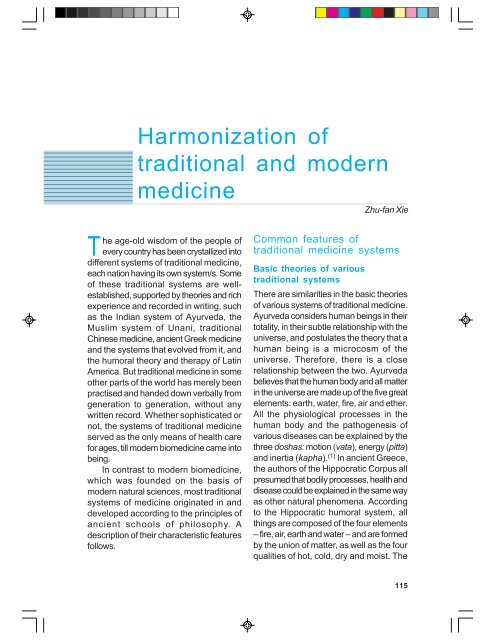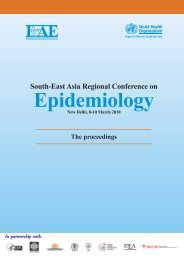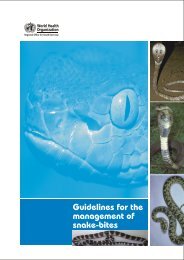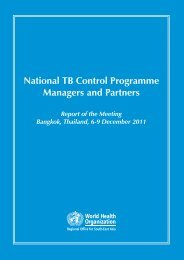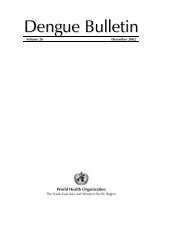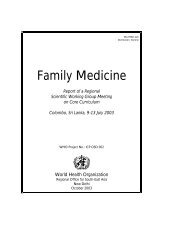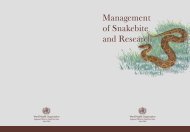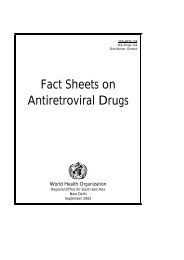Traditional Medicine in Asia
Traditional Medicine in Asia
Traditional Medicine in Asia
Create successful ePaper yourself
Turn your PDF publications into a flip-book with our unique Google optimized e-Paper software.
The age-old wisdom of the people of<br />
every country has been crystallized <strong>in</strong>to<br />
different systems of traditional medic<strong>in</strong>e,<br />
each nation hav<strong>in</strong>g its own system/s. Some<br />
of these traditional systems are wellestablished,<br />
supported by theories and rich<br />
experience and recorded <strong>in</strong> writ<strong>in</strong>g, such<br />
as the Indian system of Ayurveda, the<br />
Muslim system of Unani, traditional<br />
Ch<strong>in</strong>ese medic<strong>in</strong>e, ancient Greek medic<strong>in</strong>e<br />
and the systems that evolved from it, and<br />
the humoral theory and therapy of Lat<strong>in</strong><br />
America. But traditional medic<strong>in</strong>e <strong>in</strong> some<br />
other parts of the world has merely been<br />
practised and handed down verbally from<br />
generation to generation, without any<br />
written record. Whether sophisticated or<br />
not, the systems of traditional medic<strong>in</strong>e<br />
served as the only means of health care<br />
for ages, till modern biomedic<strong>in</strong>e came <strong>in</strong>to<br />
be<strong>in</strong>g.<br />
In contrast to modern biomedic<strong>in</strong>e,<br />
which was founded on the basis of<br />
modern natural sciences, most traditional<br />
systems of medic<strong>in</strong>e orig<strong>in</strong>ated <strong>in</strong> and<br />
developed accord<strong>in</strong>g to the pr<strong>in</strong>ciples of<br />
ancient schools of philosophy. A<br />
description of their characteristic features<br />
follows.<br />
Harmonization of traditional and modern medic<strong>in</strong>e<br />
Harmonization of<br />
traditional and modern<br />
medic<strong>in</strong>e<br />
Zhu-fan Xie<br />
Common features of<br />
traditional medic<strong>in</strong>e systems<br />
Basic theories of various<br />
traditional systems<br />
There are similarities <strong>in</strong> the basic theories<br />
of various systems of traditional medic<strong>in</strong>e.<br />
Ayurveda considers human be<strong>in</strong>gs <strong>in</strong> their<br />
totality, <strong>in</strong> their subtle relationship with the<br />
universe, and postulates the theory that a<br />
human be<strong>in</strong>g is a microcosm of the<br />
universe. Therefore, there is a close<br />
relationship between the two. Ayurveda<br />
believes that the human body and all matter<br />
<strong>in</strong> the universe are made up of the five great<br />
elements: earth, water, fire, air and ether.<br />
All the physiological processes <strong>in</strong> the<br />
human body and the pathogenesis of<br />
various diseases can be expla<strong>in</strong>ed by the<br />
three doshas: motion (vata), energy (pitta)<br />
and <strong>in</strong>ertia (kapha). (1) In ancient Greece,<br />
the authors of the Hippocratic Corpus all<br />
presumed that bodily processes, health and<br />
disease could be expla<strong>in</strong>ed <strong>in</strong> the same way<br />
as other natural phenomena. Accord<strong>in</strong>g<br />
to the Hippocratic humoral system, all<br />
th<strong>in</strong>gs are composed of the four elements<br />
– fire, air, earth and water – and are formed<br />
by the union of matter, as well as the four<br />
qualities of hot, cold, dry and moist. The<br />
115


